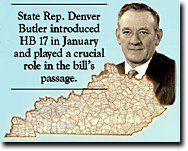On April 24, 2006, after unanimous passage by the Kentucky Senate and House of Representatives, Gov. Ernie Fletcher affixed his signature to House Bill 17, one of the first pieces of legislation voted on in the 2006 session.
"I've known people who have been helped tremendously with acupuncture," said state Rep. Denver Butler, chair of the House Licensing and Occupations Committee, who introduced the bill and was instrumental in its passage. "Acupuncture has been around for more than 4,000 years in China. The medical doctor may not be able to explain why, but it does help, and I felt that people deserved that opportunity to try it and be helped."
 House Bill 17 was introduced in the Kentucky House by Rep. Butler on Jan. 3, 2006, and assigned to the Licensing and Occupations Committee three days later. On Feb. 7, it passed the House 96-0 and was sent to the Senate for review by the Senate Licensing, Occupations & Administrative Regulations Committee. On March 23, the Senate passed the bill 36-0, at which time it was returned to the House, which passed it by a 95-0 vote on April 10. According to the Kentucky Legislature's Public Information Office, the bill will officially go into effect July 12, 2006.
House Bill 17 was introduced in the Kentucky House by Rep. Butler on Jan. 3, 2006, and assigned to the Licensing and Occupations Committee three days later. On Feb. 7, it passed the House 96-0 and was sent to the Senate for review by the Senate Licensing, Occupations & Administrative Regulations Committee. On March 23, the Senate passed the bill 36-0, at which time it was returned to the House, which passed it by a 95-0 vote on April 10. According to the Kentucky Legislature's Public Information Office, the bill will officially go into effect July 12, 2006.
Rather than requiring licensure, HB 17 calls for a certification process, whereby practitioners will be certified by the Kentucky Board of Medical Licensure to practice acupuncture. To be certified, applicants must:
- submit a completed and board-approved application for certification;
- be "of good character and reputation;"
- have passed the acupuncture examination administered by the National Certification Commission for Acupuncture and Oriental Medicine; and
- have graduated from a course of training that has been approved by the Accreditation Commission for Acupuncture and Oriental Medicine and that is at least 1,800 hours in length, including 300 clinical hours.
Applicants who meet these criteria would be allowed to use the "CAc" designation and to call themselves "certified acupuncturists." Certificates will be renewed every two years, with all practitioners required to complete 30 hours of continuing education biennially as a condition of renewal.
For longtime practitioners who might not meet the bill's requirement of 1,800 hours of training, HB 17 includes a grandfathering provision that allows them until July 1, 2007, to achieve certification provided they meet the bill's other requirements. For acupuncturists who currently practice outside of Kentucky and might want to relocate, HB 17 also includes a provision that allows them to be "certified by endorsement" from the state of that acupuncturist's credentialing, provided the state has standards "substantially equivalent to those" of Kentucky.
Acupuncturists practicing in Kentucky will be subject to a somewhat restrictive scope of practice that allows for the insertion of needles "with or without accompanying electrical or thermal stimulation" at certain points or meridians "for purposes of changing the flow of energy in the body." Acupressure, cupping, moxibustion and dermal friction also are allowed. However, acupuncturists will be prohibited from practicing "laser acupuncture, osteopathic manipulative treatment, chiropractic adjustments, physical therapy or surgery." The bill does not specify whether acupuncturists may dispense herbs or recommend dietary supplements as part of their scope of practice.
All certified acupuncturists will be required to develop a written plan for consultation, emergency transfer and referral of patients to appropriate health care facilities or to other health care practitioners. While diagnosis is not included in an acupuncturist's scope of practice, if a patient discloses that he or she suffers from one of several "potentially serious disorders or conditions" during acquisition of the patient's medical history, the acupuncturist must verify that the patient currently is under the care of a physician and consult with the treating physician before performing acupuncture. If the patient refuses to provide a medical history or disclose information regarding any of those conditions, acupuncture treatment shall not be provided.
In addition to establishing certification standards and a scope of practice, HB 17 requires the Board of Medical Licensure to create an eight-member Acupuncture Advisory Committee, which is charged with reviewing and making recommendations to the board regarding standards of practice, continuing education requirements, renewal requirements, and other matters related to the practice of acupuncture. Four acupuncture practitioners will serve on the committee, with all committee members serving four-year terms.
The passage of HB 17 leaves only seven states (Alabama, Delaware, Mississippi, North Dakota, Oklahoma, South Dakota, and Wyoming) without regulations allowing for the practice of acupuncture by licensed, registered or certified acupuncturists. Prior to Kentucky, the most recent state to pass an acupuncture licensing law was Michigan, whose governor, Jennifer Granholm, signed Senate Bill 351 into law in February.
Acupuncture Today editorial staff members research, investigate and write articles for the publication on an ongoing basis. To contact the Editorial Department or submit an article of your own for consideration, email mailto:
.



